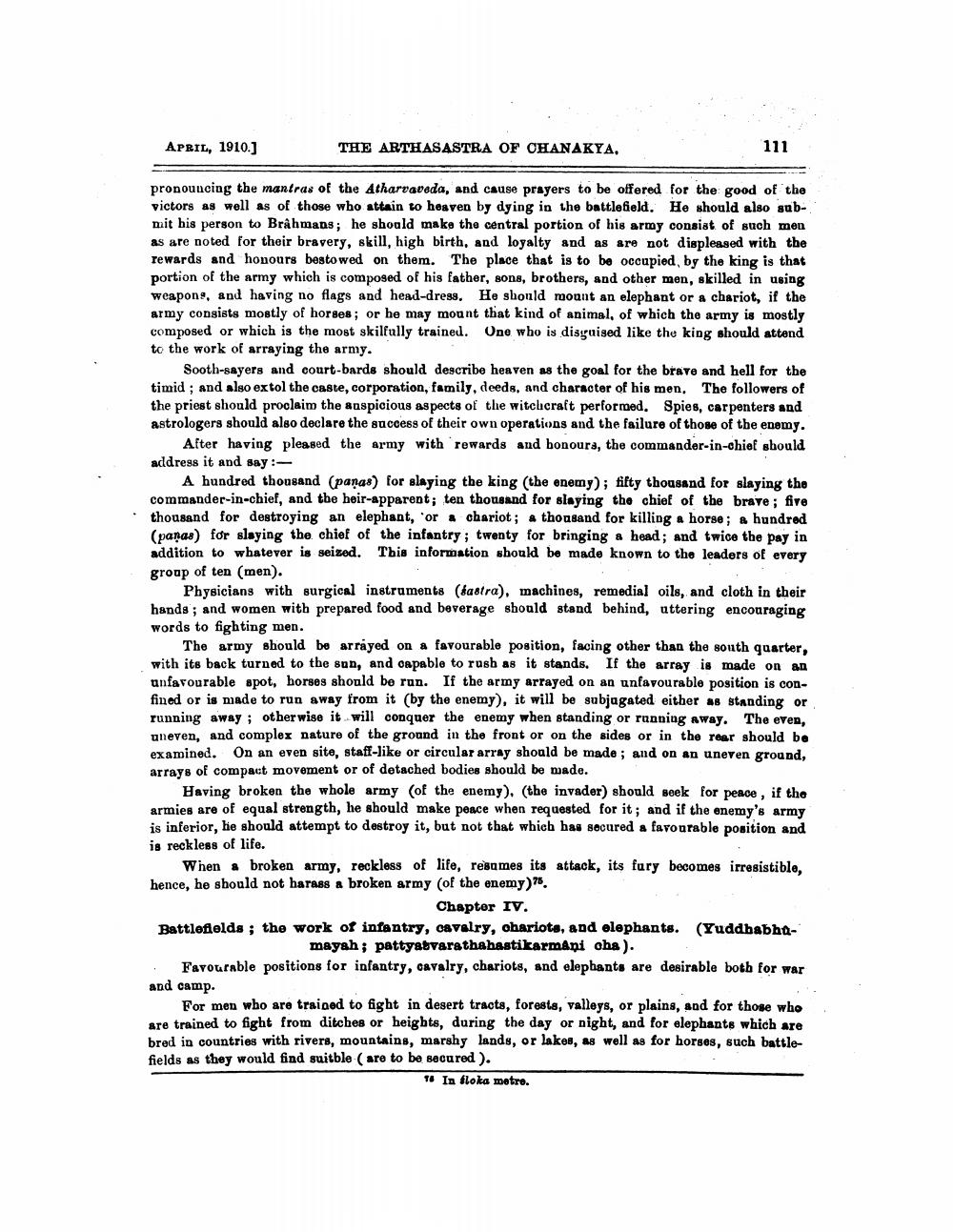________________
APRIL, 1910.)
THE ARTHASASTRA OF CHANAKYA.
111
pronouncing the mantras of the Atharvaveda, and cause prayers to be offered for the good of the victors as well as of those who attain to heaven by dying in the battlefield. He should also submit his person to Brâhmans; he should make the central portion of his army consist of such men as are noted for their bravery, skill, high birth, and loyalty and as are not displeased with the rewards and honours bestowed on them. The place that is to be occupied by the king is that portion of the army which is composed of his father, sons, brothers, and other men, skilled in using weapons, and having no flags and head-dress. He shonld mount an elephant or a chariot, if the army consists mostly of horses; or he may mount that kind of animal, of which the army is mostly composed or which is the most skilfully trained. One who is disguised like the king should attend to the work of arraying the army.
Sooth-sayers and court-bards should describe heaven as the goal for the brave and hell for the timid ; and also extol the caste, corporation, family, deeds, and character of his men. The followers of the priest should proclaim the auspicious aspects of the witchcraft performed. Spies, carpenters and astrologers should also declare the success of their own operations and the failure of those of the enemy.
After having pleased the army with rewards and honours, the commander-in-chief should address it and say :
A hundred thousand (paņas) for slaying the king (the enemy); fifty thousand for slaying the commander-in-chief, and the heir-apparent; ten thousand for slaying the chief of the brave ; five thousand for destroying an elephant, 'or & chariot; a thousand for killing a horse; a hundred (panas) for slaying the chief of the infantry; twenty for bringing a head; and twice the pay in addition to whatever is seized. This information should be made known to the leaders of every group of ten (men).
Physicians with surgical instruments (dastra), machines, remedial oils, and cloth in their hands; and women with prepared food and beverage should stand behind, uttering encouraging words to fighting men.
The army should be arrayed on a favourable position, facing other than the south quarter, with its back turned to the son, and capable to rush as it stands. If the array is made on an unfavourable spot, horses should be run. If the army arrayed on an unfavourable position is confined or is made to run away from it (by the enemy), it will be subjugated either as standing or running away ; otherwise it will conquer the enemy when standing or running away. The even, aneven, and complex nature of the ground in the front or on the sides or in the rear should be examined. On an even site, staff-like or circular array should be made ; and on an uneven ground, arrays of compact movement or of detached bodies should be made.
Having broken the whole army of the enemy). (the invader) should seek for peace , if the armies are of equal strength, he should make peace when requested for it; and if the enemy's army is inferior, he should attempt to destroy it, but not that which has socured a favourable position and is reckless of life.
When a broken army, reckless of life, resumes its attack, its fury becomes irresistible, hence, he should not harass a broken army of the enemy) 7.
Chapter IV. Battlefields; the work of infantry, cavalry, ohariots, and elephants. (Yuddhabh
mayah; pattyabvarathahastikarmani ohs). Favourable positions for infantry, cavalry, chariots, and elephants are desirable both for war and camp
For men who are trained to fight in desert tracts, forests, valleys, or plains, and for those who are trained to fight from ditches or heights, during the day or night, and for elephants which are bred in countries with rivers, mountains, marshy lands, or lakes, as well as for horses, such battlefields as they would find suitble ( are to be secured).
16 In floka matre.




